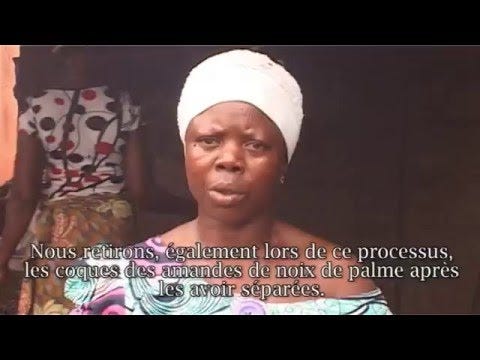::This short recording was taped December 2019 in London, England. At request of the interviewee, their name and details about their identity have been left out.::
Aside from these very public monthly articles and former audios, I spend a lot of time listening to the sounds and discussions of the world. Or immersed in my own thoughts; mulling over millions of scenarios—some pleasant, some apocalyptic—and/or finding distraction in the mundane and complex things happening immediately around me, or even imagining what someone on the other side of the world is doing at this very same time. Did they also see the waxing moon last night or remember too late to buy dish soap for the third day in a row? I have tested as an INFP personality (introverted, intuitive, feeling, prospecting). We make great listeners and are incredibly empathetic—ha sounds like a podcast interviewer was/is one such calling I was destined for!
Like many fellow humans following cycles and divine feminine patterns, there are some days/weeks with incredible bursts of energy and enthusiasm, and others replete with complete exhaustion and ambivalence. Following intense social interaction, such as too many Spanish meals over a holiday period, in-person conferences, or even too many back-to-back webinars and video calls, I need to retreat to a mostly solitary, quiet space—I don’t even like to take phone calls in this stage of my personal and reoccurring metamorphosis. In fact, I always surprise myself just how much I adore—require—this alone time, when for sometime I thought I identified as a “people person” and spent a large portion of my youth as part of various sports teams. What brings me alive in public is a curiosity to understand who we are deep inside, why we are where we are, what obstacles we overcame, what we’ve chosen to do with our time on Earth, and what keeps us motivated to interact with this world and each other—knowing there is hurt, struggle, and uncertainty. Most small talk will make me retreat again, but if you’re willing to go from zero to sixty shortly after meeting (and are humble about it), we’ll be fast and furious conversationalists (even if only in that fleeting moment). If one was a fly on the wall, we’ll surely have touched on a few themes that could easily turn into one or various podcast episodes. Although, I also very much revel in the intimacy of keeping a number of things for our ears/eyes only; INFPs are fabulous storers of others’ secrets.
Such is the case for this “minisode” that I am sharing today. Coming off a three month chocolate-gig in London, consisting of daily walks amongst damp foliage lined streets and work shifts in cold tempering rooms, stirring, molding and boxing for the holiday season, I found my way heading back south, such as the wood warblers, long-distance migratory birds wintering in tropical climates. Back towards Spain—and if I kept going, Africa. Worlds met in the taxi cab en route to the airport, as the Uber driver, a pensive gentleman with large eyes and wide hands, accepted the gift of chocolate (I know many of you reading this open your purses and bags to share with fellow humans too!), and began to tell me of his memories of cocoa during his infancy and adolescence in Ghana. I told him of my passion for sharing audios and deep respect for cocoa, and requested that I could record his tales. He obliged, albeit he wished to remain anonymous.
Undoubtedly, there is an epidemic of native forest destruction related to palm oil. It has been documented and made into very public and viral Greenpeace campaigns calling out offenders such as Mondelez International, Inc. and Nestlé—both manufacturers, and culprits, of poor cocoa practices as well. But as we’ve discussed in previous posts, nothing is a monolith. In some areas of the world, including West Africa, the palm is still highly revered as a foodstuff, domestic product, and income generating commodity. As you’ll hear from this short conversation of “taxi cab confessions”—in his opinion, the palm (was)is more fruitful than cocoa, given that it is used in cuisine, its leaves are also utilized for household items like brooms and baskets, and according to his account, the frequency of when farmers got(get) paid in his village was(is) more often than that of cocoa. This might be changing from his impressions of the 1980s during a massive slump in prices, and in all fairness, I have no experience working directly with representatives of Ghana or the Ghana Cocoa Board (Cocobod), but when I hear stories such as these, I am reminded that we have to take into consideration the nuances of each farming community, their unique demographics, crop(s) harvest schedules, and corresponding utility of a plant to a region and its people.
I’d like to think that farmers are given the choice—”What do you want to plant? What is best for you and your family and generations to come?” And that they receive unbiased, supportive, truthful consultation on those choices. However, I am sure those questions are not always asked, nor made easy with interventions, subsidies, living-wage battles, rising inflation, and worries of putting food on the table, today. When things only exist for exportation and/or consumption elsewhere, communities are more vulnerable, family dynamics pressured, food and job insecurity heightened, and local identities challenged. Cocoa and palm oil have both made significant cultural, environmental and economical dents in their respective places of origin and contemporary growth regions—much at the bidding of forceful colonial expansion and trade, and modern-day extractive capitalism. There has also been, tremendous adoption of foreign crops as their own; monetary units, symbols on flags and textiles, and burial pieces speak to the pride associated with West Africa’s authority on the matter. Whether this country or that one, the ethics of commodified production remain a topic of discussion for stakeholders, governments and board members, however the argument couldn’t be any clearer: Who holds the power? Who captures the wealth? Who faces precarity or danger?
Archaeological evidence shows that the African oil palm (Elaeis guineensis), the tree producing palm fruit and kernels and subsequently the oil extracted from them, formed an integral part of West African diets dating back 5,000 years ago. Originating from West Africa, it was later industrialized in southeast Asia, where 85% of global production is now attributed to that of Indonesia and Malaysia. Production has also since spread to Latin America. Pick up various CPG (consumer packaged goods) items, from cosmetics to instant noodles, candles to cookies, and you’re extremely likely to be holding the derivative of mass-produced palm oil in your hand. A similar storyline, follows the resulting—but not permanent—fate of cocoa in West Africa; brought from a far-flung birthplace across the seas, embedded as plantation crops, protagonist of chattel slavery, labor and human rights issues, regarded as lesser than, grown exceedingly out of proportion to endemic fruits and vegetables, decimating forests and biodiversity, and occupying worrisome booms and busts on the market over the last century—all at the benefit of few multinationals, rather than the millions of locals, animals, and trees that call(ed) that land home.
Here’s an interesting quote from GRAIN on the adulteration of palm oil, “The development of high-yielding oil palms and new processing techniques—which transformed the traditionally viscous red liquid into a colourless, odourless oil suitable for global markets—made oil palm plantations a lucrative investment. In recent years, the expansion has targeted Africa with a vengeance.”
Broadly speaking, when we mass-industrialize a process, we inherently change it. Arguably, we change ourselves. What do we get when we ask other cultures and ecosystems to adapt a non-native crop at a tremendous pace for privatized greed and political agendas, often in the name of consumer joy or benefit? Unfortunately, we are seeing many scenarios such as this play out, as among the wealthiest of the world we’ve exercised our “right” to consume, to have and to hold just about anything, at anytime. We are not too late however (and this is not solely my hyperbole, but a belief held by a number of scientists and environmental activists who feel and desire optimism; see ‘All We Can Save: Truth, Courage, and Solutions for a Climate Crisis’). When we look to getting out of the mess of “the commodification of everything”, can we look to the way cultures appreciate and honor what their great-great-great-great grandparents and beyond cherished? Value addition will not only come from changing the landscape of current operations and practices, it will require instilling habits, peoples, foodstuffs and lore of the distant pre-colonial past. Sustainable cocoa OR sustainable palm isn’t the only answer, they together—and blended with others—are potentially pieces of coexistence. It is possible to have unadulterated systems with mixed crops, cared for by—and firstly for—the local people, as well as extended services of export. But I firmly believe producers’ and regional sovereignty must be paramount. In a system built for legitimate sustainability, not just “certified sustainable” crops, we in the Global North should only have our frivolous chocolates, travel-ready shampoos and packaged snack cookies after traditional production and needs are met. The choice at the checkout counter is ours.
What are we’re willing to take on; is origin made chocolate a part of your range? Are you making efforts to switch from status quo? Locally to you, who is making shampoo with clean/transparent supply chains of olive oil or sunflower oil? Now that you’ve remembered to buy the dish soap—how and by who was it made? We have to ask the questions to see where the gaps are.
I wished I exchanged Whatsapp information with the driver and main character of our story, so that I could let him know that in three years time, locals in Ghana have made steps towards producing more chocolate in-country, as well as finished goods for export. Maybe he has already heard this from the chirps of the arriving wood warblers, on their way back north, with a message of hope, of cocoa and palm futures—respecting the plausible symbioses, of crossed continents, mixed-up dreams, and shared car rides that show us, in the end, we’re all on this journey together.
To close, please enjoy watching the process of traditional palm oil production in Benin. Let’s sit with the responsibility of letting communities decide what they’ll harvest, value, and eat.
Further reading:
Eater There Has Been Blood
The Canadian African Don’t Ask West Africans to Stop Cooking with Palm Oil
Endangered Maize: Industrial Agriculture and the Crisis of Extinction by Helen Anne Curry












Share this post